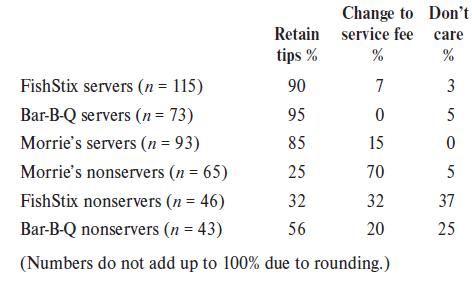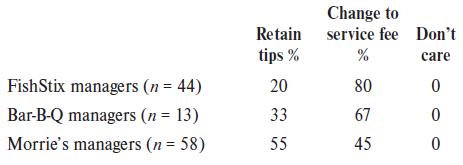Your consulting company has been asked to conduct a report for Diamond Enterprises, which runs three national
Question:
Your consulting company has been asked to conduct a report for Diamond Enterprises, which runs three national chains:
FishStix, The Bar-B-Q Pit, and Morrie’s. All are medium-priced, family-friendly restaurants. The CEO is thinking of replacing optional tips with a 15% service fee automatically added to bills.
You read articles in trade journals, surveyed a random sample of 200 workers in each of the chains, and conducted an email survey of the 136 restaurant managers. Here are your findings:
1. Trade journals point out that the Internal Revenue Service
(IRS) audits restaurants if it thinks that servers underreport tips. Dealing with an audit consumes time and often results in the restaurant’s having to pay penalties and interest.
2. Only one Morrie’s restaurant has actually been audited by the IRS. Management was able to convince the IRS that servers were reporting tips accurately. No penalty was assessed. Management spent $5,000 on CPA and legal fees and spent over 80 hours of management time gathering data and participating in the audit.
3. Restaurants in Europe already add a service fee (usually 15%) to the bill. Patrons can add more if they choose.
Local custom determines whether tips are expected and how much they should be. In Germany, for example, it is more usual to round up the bill (e.g., from 27€ to 30€)
than to figure a percentage.
4. If the restaurant collected a service fee, it could use the income to raise wages for cooks and hosts and pay for other benefits, such as health insurance, rather than giving all the money to servers and bussers.
5. Morrie’s servers tend to be under 25 years old. FishStix employs more servers over 25, who are doing their jobs for a career. The Bar-B-Q Pit servers are students in college towns.
6. In all three chains, servers oppose the idea. Employees other than servers generally support it.
7. Servers said that it was important to go home with money in their pockets (92%); that their expertise increased food sales and should be rewarded (67%); and that if a service fee replaced tips, they would be likely to look for another job (45%). Some (17%) thought that if the manager distributed service-fee income, favoritism rather than the quality of work would govern how much tip income they got. Most (72%) thought that customers would not add anything beyond the 15% service fee, and many (66%)
thought that total tip income would decrease and their own portion of that income would decrease (90%).
8. Managers generally support the change.
9. Comments from managers include: “It isn’t fair for a cook with eight years of experience to make only $12 an hour while a server can make $25 an hour in just a couple of months” and “I could have my pick of employees if I offered health insurance.”
10. Morale at Bar-B-Q Pit seems low. This low morale is seen, in part, in the low response rate to the survey.
11. In a tight employment market, some restaurants might lose good servers if they made the change. However, hiring cooks and other nonservers would be easier.
12. The current computer systems in place can handle figuring and recording the service fee. Because bills are printed by computer, an additional line could be added. Allocating the service-fee income could take extra managerial time, especially at first.
Write the report.
Step by Step Answer:

Business Communication
ISBN: 9781265045630
13th Edition
Authors: Kitty O. Locker, Jo Mackiewicz, Jeanine Elise Aune, Donna S. Kienzler Professor





